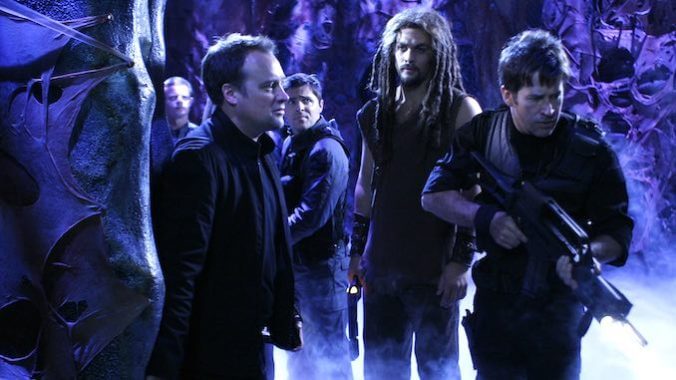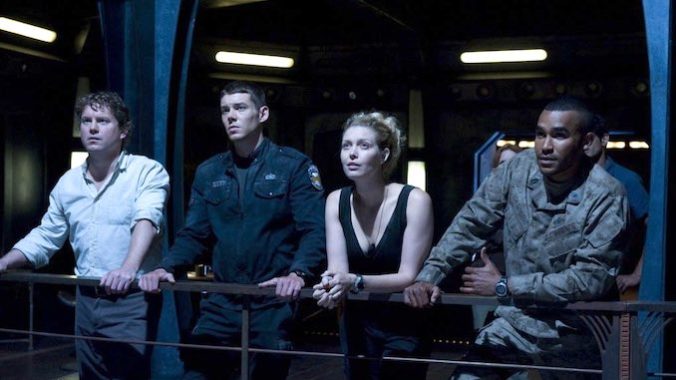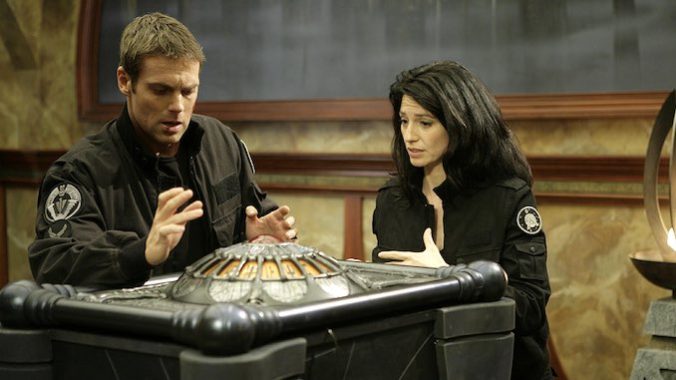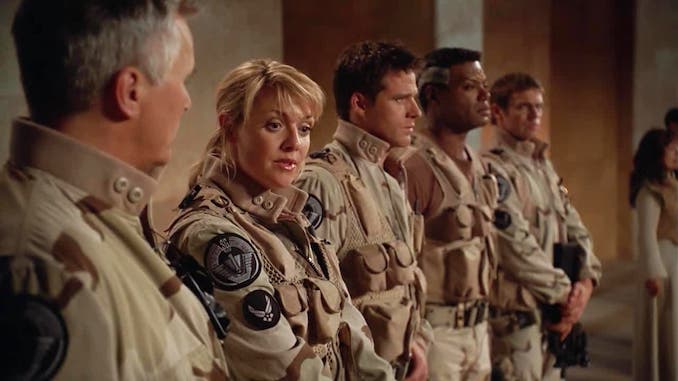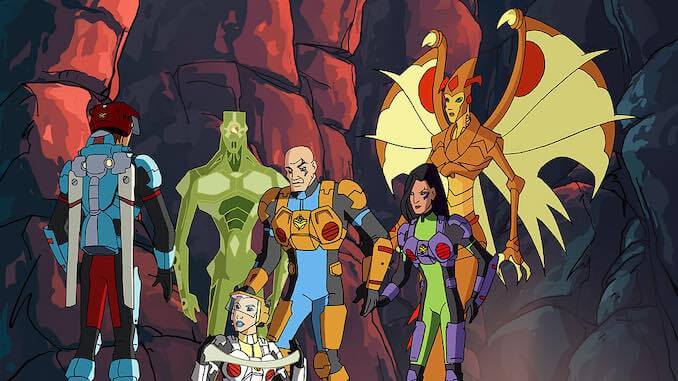Not Wars, Not Trek—The Other One: Exploring Stargate, the Biggest Sci-Fi Franchise You’ve (Probably) Never Heard Of
Photo Courtesy of MGM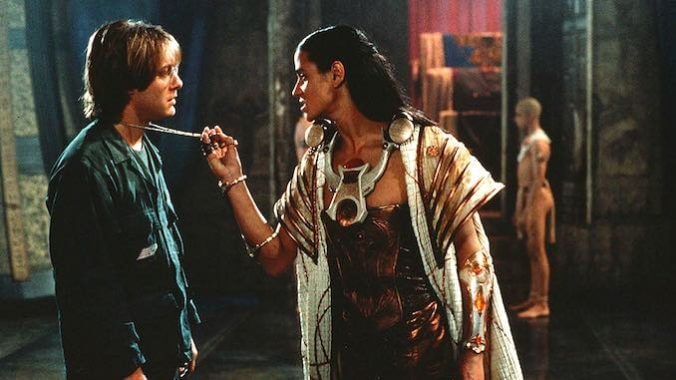
Let’s talk about one of the biggest sci-fi franchises in the world. We’ll give you a hint: it starts with “Star.” No, not that one. Or that one, either.
Sure, Star Trek and Star Wars are arguably the first properties that come to mind. But there’s another “Star” franchise that’s been around for decades and has told as many, or more, stories than those other two combined:
Stargate.
It all started with a lightly-heralded 1994 sci-fi flick about a weird Egyptian artifact that’gla;s really a portal to another planet, and evolved to include multiple television shows (most notably the long-running Stargate SG-1), multiple films, a web series, and even a short-lived streaming service (yes, really)—all built around the simple pitch of modern-day heroes exploring exciting, alien worlds.
But despite running for more than 350 hours of television with SG-1, and spinoffs Stargate Atlantis and Stargate Universe, and those series airing in more than 100 countries and reaching as many as 17 million viewers per week at its peak, Stargate still isn’t spoken in the same breath as the other big “Stars” franchises. So why is that?
We asked Darren Sumner, founder of the popular GateWorld fan site, as he has helped build and grow the fan community around the franchise since 1999. Sumner believes the gap simply comes down to timing.
“I’d attribute much of that to the era when it entered the cultural zeitgeist. There were only three television networks when Star Trek premiered; then it got a series of high-profile feature films. Star Wars was a mega hit from 1977,” Sumner told Paste. “Stargate had a moderately successful film in the 1990s, premiered on a pay cable channel in 1997, and by the time it had mass accessibility (through syndication and Sci-Fi Channel in the U.S.) the entertainment landscape was pretty crowded.”
The other big difference between Stargate and those other sci-fi franchises? Where Trek and Wars are set in the far-flung future, or galaxies far, far away, Stargate is set in the present day, with no lightsabers or starships (well, at least not until later seasons) to make it seem too fantastical.
“The characters are easy to relate to because they are us. Whether it’s Jack’s courage and his subversive humor, Daniel’s moral integrity, Sam’s brilliance, or Teal’c’s deep desire for freedom, every member of the team was in some sense the kind of people all of us aspire to be,” Sumner opined. “These are also shows with big ideas, and writers that respect the audience. I love the franchise because Stargate built a mythology where past events really matter. SG-1 and Atlantis are told in a weekly episodic fashion, but without that dreaded ‘reset button.’ So long-time viewers were continually rewarded by characters, ideas, and plot points coming back around… sometimes years later.”
There’s also the fact that, despite all the success of the recent past, the Stargate franchise has largely been left for dead the past several years. Aside from a web series, the franchise has been dormant for the better part of a decade, while Star Trek is building an entire universe of spinoffs on Paramount+, and Star Wars has taken over Disney+ with original projects, most recently the acclaimed Rogue One-spinoff Andor.
Stargate is owned by MGM, which was recently acquired by Amazon, and fans are hopeful that means the streaming service has some type of plan to bring the franchise back for some long-awaited new adventures. The resilient presence of Sumner’s popular fan site is proof that there are still plenty of fans out there jonesing for fresh content—he just hopes any future revival won’t toss the old continuity out the window.
“Stargate’s fan base has been exceptionally patient in waiting for word of a new production. With the amount of entertainment being produced today, and the number of classic series and franchises being resurrected, it’s actually getting a bit ridiculous that the studio hasn’t pulled the trigger on anything new yet. Or at least signal that they are thinking about it,” Sumner said. “I’m an optimist, so I continue to have high hopes that the Amazon deal will finally break the logjam and get a new series into production. I hope it isn’t a reboot. I like the original film a lot, but I fell in love with this franchise through the characters and the world building of the TV series. So I would like some form of continuation.”
Interestingly enough, original SG-1 co-creator Brad Wright has teased work on a script for a revival of the old series, which would bring back fan favorite characters and tee up a new adventure. Sumner said he hopes that’s a signal for where Amazon might take the franchise, but whatever happens, he hopes the next chapter will at least stay true to what brought fans to the shows in the first place.
“There have been a lot of shows that I’ve loved but never felt all that drawn to go back and rewatch years later. Something about Stargate’s formula makes it highly rewatchable. I think it’s probably the episodic nature combined with its humor and charm,” he said. “Fans can go back and visit an old favorite on the spur of the moment, and not feel like they have to commit to a 200-episode rewatch. In the mood for a comedy? A character drama? An outer-space adventure? A little romance? Want to see a System Lord get taken out? Or a time travel romp? It’s like picking an ice cream flavor—Stargate has it all.”
So for those who are less familiar with the franchise, let’s start with the basics: What is Stargate? Where can you find it? What’s the story’s timeline? Let’s dig in.
![]()
The Movie That Started It All
Stargate (1994)
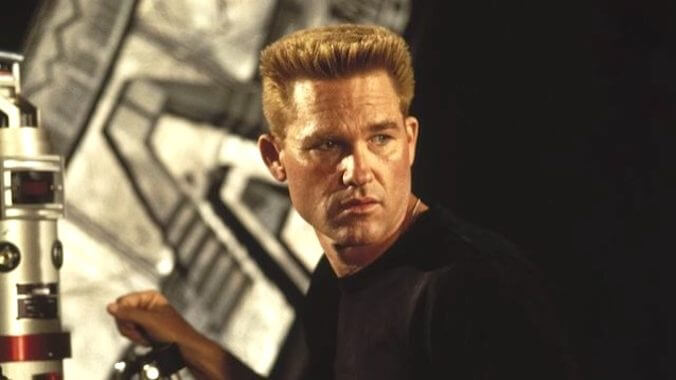
Oh, what humble beginnings. The 1994 Stargate film was created by disaster flick maestros Dean Devlin and Roland Emmerich (who were also behind Independence Day and Godzilla), and proved a modest success at the box office for a fall release, bringing in just shy of $200 million on its total worldwide theatrical run against a budget of $50 million. The film starred Kurt Russell as no-nonsense military man Jack O’Neil, who is paired with a bookish Egyptologist played by a young James Spader.
After Spader’s Dr. Daniel Jackson cracks the code to activate an ancient piece of alien technology, the pair lead a small team through the fantastical device that is actually an interstellar portal to an alien world, which looks a whole lot like Ancient Egypt and is ruled by a wildly egotistical alien (played by Jaye Davidson, coming off an acclaimed debut in 1992’s The Crying Game), who has taken on the identity of the ancient Egyptian sun god Ra.
It’s a mid-budget sci-fi action flick with some unique visuals and twists thanks to the ancient Egypt-style setting, but despite the decent box office performance (and even a tie-in videogame for the SNES and SEGA Genesis, which critics panned), the franchise stopped at one film. Devlin and Emmerich would later reveal they’d hoped to create a trilogy of Stargate films; those never made it off the drawing board, though their rough pitch for the trilogy was loosely adapted into a five-book series of Stargate novels in the late 1990s by author Bill McCay.
![]()
The SG-1 Universe of TV shows
Stargate SG-1 (1997-2007)
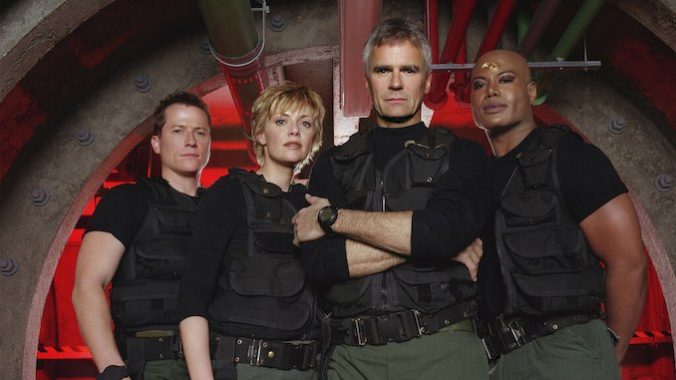
Watch on Netflix (until 11/30)
Instead of film sequels, MGM was more interested in turning the Stargate brand into a television series, so they brought in sci-fi vets Brad Wright and Jonathan Glassner (The Outer Limits) who had a unique pitch for how to take the film and adapt it for television. The twist? The Stargate doesn’t just go to that one planet from the film, but potentially thousands of planets across the universe—making the perfect set-up for an “adventure of the week” sci-fi series.
Richard Dean Anderson (MacGyver) took over the military role originated by Russell, bringing a bit more levity to it (he jokingly spells his Jack O’Neill with two l’s). The cast is rounded out by Micheal Shanks, taking over Spader’s role as Daniel Jackson, and newcomers Amanda Tapping (Samantha Carter) and Christopher Judge (the alien Teal’c), who together make up the core ensemble of SG-1, the flagship team of military explorers who will use the Stargate.
Though the Stargate franchise would eventually be best known as a Sci-Fi Channel original, it started life on the pay cable Showtime network for its first five seasons, becoming a solid hit and gaining more fans year-to-year in syndication.
Showtime decided to pull the plug on the series after five seasons, which is when the Sci-Fi Channel stepped in to save it (reruns of the early seasons had already proven a solid hit for the network). Sci-Fi eventually renewed it for another five years, bringing the total run to 10 seasons. The cast would shake up a bit along the way in the later years, with Farscape alumni Ben Browder and Claudia Black eventually joining the series, and Anderson’s role reduced to “recurring” in those final seasons.
Through it all, SG-1 stayed largely true to its original pitch, with the team spending most episodes exploring new worlds, revisiting old ones to see what fresh chaos has emerged, and facing off with super-powered aliens. (They’d eventually cycle through a few different evil alien races along the way, though they all seemed to stick to the “false god” concept pioneered in the original 1994 film).
After the series wrapped, the creators would go on to produce two direct-to-DVD to continue the story with a couple more adventures.
-

-

-

-

-

-

-

-

-

-

-

-

-

-

-

-

-

-

-

-

-

-

-

-

-

-

-

-

-

-

-

-

-

-

-

-

-

-

-

-

